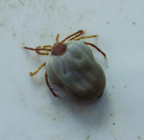Tick Control in Edison, Somerset, Lakewood
How does Cowleys help homeowners with their tick problem?

Mosquito & Tick Reduction Program includes:
- Initial treatment in April
- Monthly treatments April - October
- 100% satisfaction guarantee

What are ticks?
Ticks, while often referred to as "bugs," are actually arachnids, belonging to the same family as spiders, scorpions, and mites. These minuscule external parasites feed on the blood of a wide range of hosts, including wild and domestic animals, birds, reptiles, and humans.
Ticks have a remarkable ability to detect their hosts, using cues such as carbon dioxide, body heat, and scent. Given their habitat in wooded areas, fields, and brushy landscapes, individuals who spend time outdoors, whether for work or recreation, are at risk of encountering ticks. Even activities as simple as gardening in one's backyard can lead to tick exposure.
In New Jersey, ticks are prevalent, and their bites pose a significant risk of disease transmission. It's essential for individuals to be aware of the potential health consequences associated with tick bites, as these tiny creatures can cause long-term health issues by transmitting infected blood. The longer a tick remains attached and feeds on its host, the greater the likelihood of disease transmission. Therefore, taking proactive measures to prevent tick bites and promptly seeking professional pest control services can help mitigate the risks associated with tick infestations.
Recent Testimonials
How are ticks identified?
 Ticks, belonging to the arachnid family like spiders, have eight legs and two body segments in their adult stage. While the black-legged tick, also known as the deer tick, is as small as the head of a pin, dog ticks can grow up to half an inch long. However, the size alone doesn't determine the tick species, as their appearance changes through their life stages from larva to nymph and adult.
Ticks, belonging to the arachnid family like spiders, have eight legs and two body segments in their adult stage. While the black-legged tick, also known as the deer tick, is as small as the head of a pin, dog ticks can grow up to half an inch long. However, the size alone doesn't determine the tick species, as their appearance changes through their life stages from larva to nymph and adult.
The nymph stage poses a particular risk as ticks are extremely tiny at this point, resembling a poppy seed, yet they can carry potentially infected blood, leading to tick-borne illnesses that are challenging to diagnose and treat. Often, these nymph ticks bite and detach without the host noticing their presence.
Identifying ticks isn't straightforward, even for experts. The safest approach is to have the tick identified and, if necessary, tested by a laboratory to determine if it carries any diseases.
The level of engorgement in ticks is crucial because disease transmission doesn't occur immediately, and the engorgement level indicates how long the tick was attached. In New Jersey, every county offers tick identification and testing programs, which should be utilized. It's worth noting that nearly 50% of adult black-legged ticks in New Jersey are estimated to be infected with Lyme disease, underscoring the importance of proactive measures and professional assistance in dealing with ticks.
Where can you find ticks in New Jersey?
You don’t have to go far. Just check out your own backyard! One of the biggest misconceptions about ticks is that you can only get them trudging through deep forests and areas with high vegetation.
Studies have shown the precise opposite. Approximately 70% of Lyme disease transmissions are from tick bites in one’s own backyard.
As larvae, ticks feed on small mammals like rodents, bats, deer, and other wildlife. Ticks ingest and store infected blood from these reservoir hosts and then progress into their tiny nymph stage.
Nymphs inhabit vegetation as low as 4-6 inches, the typical vegetation found in anyone’s own yard. The ticks then transfer the diseased blood from that host to whatever or whoever is unlucky enough to be their next blood meal.
If you have questions about tick control on your property, contact the pest experts at Cowleys Pest Services for a free inspection and estimate. Our Tick Reduction Program lets you reclaim your backyard from the dangers of ticks. Protect your yard, and your family, with Cowleys thorough, safe and effective treatments.They proudly work with homeowners in Woodbridge, Edison, Lakewood, Brick, Toms River, Piscataway, Trenton, Middletown, Princeton Junction, Old Bridge, and the surrounding area.